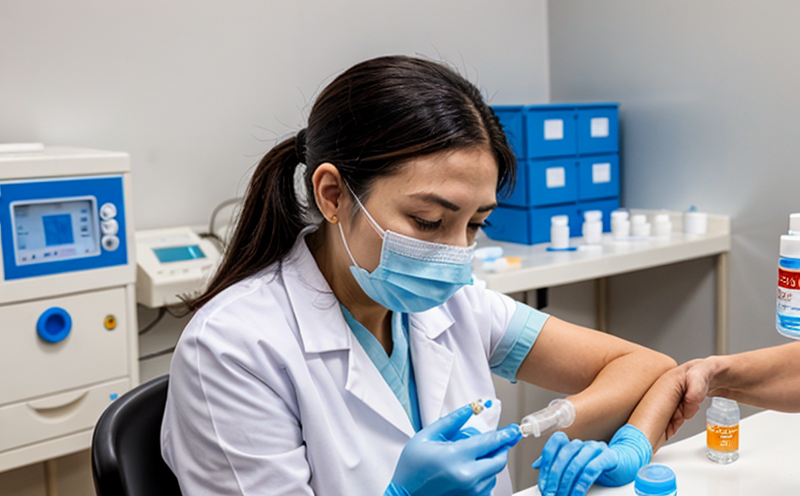USP Bacterial Endotoxin Chromogenic Assay Testing for Vaccines
The USP Bacterial Endotoxin Chromogenic Assay (BEC) is a critical quality assurance test that ensures the safety and efficacy of vaccines. This test detects the presence of bacterial endotoxins, which can cause adverse reactions in patients. Ensuring the absence or minimal levels of these endotoxins is essential for maintaining vaccine potency and patient safety.
In this testing procedure, the Chromogenic Assay utilizes a chromogen that changes color when exposed to bacterial endotoxin. The assay measures the turbidity produced by the chromogen, which is directly proportional to the amount of endotoxin present in the sample. This test is highly sensitive and can detect even trace amounts of endotoxins.
The Chromogenic Assay follows stringent protocols as outlined by United States Pharmacopeia (USP) 1. The process involves several critical steps, including the preparation of the sample, incubation with chromogen, and measurement using a microplate reader. Each step is meticulously controlled to ensure accurate results.
Sample preparation is crucial for obtaining reliable test results. This includes diluting the vaccine sample appropriately and ensuring that it is free from any contaminants that could interfere with the assay. The proper handling of samples is essential to prevent cross-contamination, which can lead to false positives or negatives.
The incubation step allows time for endotoxins, if present, to react with the chromogen. This reaction produces a visible change in color, which is measured quantitatively using a microplate reader. The sensitivity of this instrument ensures accurate measurement even at very low concentrations of endotoxin.
Results from the Chromogenic Assay are typically reported as Endotoxin Units (EU/mL). Compliance with USP standards requires that vaccines must have an endotoxin concentration below 0.25 EU/mL, which is considered safe for most populations.
The importance of this test cannot be overstated, especially in light of the global emphasis on vaccine safety and efficacy. Inaccurate or incomplete testing can lead to significant health risks, including severe allergic reactions or even death. Ensuring that every batch of a vaccine undergoes rigorous testing is paramount for public health.
Quality managers and compliance officers should ensure that their laboratories are equipped with the necessary expertise and technology to conduct these tests accurately. R&D engineers play a vital role in optimizing protocols, while procurement teams must ensure that all required reagents and equipment meet stringent quality standards.
In conclusion, USP Bacterial Endotoxin Chromogenic Assay Testing is an indispensable part of ensuring vaccine safety and efficacy. By adhering to strict protocols and using advanced instrumentation, laboratories can provide reliable test results that contribute significantly to public health.
Applied Standards
The USP Bacterial Endotoxin Chromogenic Assay strictly adheres to the guidelines provided by the United States Pharmacopeia. This standard is widely recognized and accepted globally, making it a cornerstone for ensuring vaccine safety.
- USP 85: This section of the USP outlines the procedure for the Chromogenic Assay. It specifies the use of Limulus Amebocyte Lysate (LAL), which is the reagent used in this test to detect endotoxins.
- USP 85.1: This sub-section provides detailed instructions on how to prepare and calibrate the equipment required for the Chromogenic Assay.
The use of LAL reagent is critical as it reacts with bacterial endotoxins, producing a color change that can be measured spectrophotometrically. The calibration step ensures that all measurements are accurate and consistent across different batches and laboratories.
Compliance with these standards not only enhances the reliability of test results but also ensures consistency in quality assurance practices worldwide. Laboratories must adhere to these protocols rigorously to maintain the integrity and safety of vaccines.
Eurolab Advantages
Eurolab is committed to providing top-tier pharmaceutical testing services, including USP Bacterial Endotoxin Chromogenic Assay Testing for Vaccines. Our expertise and state-of-the-art facilities ensure that every test meets the highest standards of accuracy and reliability.
- Expertise: Our team consists of highly qualified professionals with extensive experience in pharmaceutical testing. Their knowledge ensures that all tests are conducted meticulously, adhering to international standards.
- Technology: We utilize advanced equipment such as microplate readers and automated sample preparation systems to enhance the precision and speed of our assays.
- Quality Control: Eurolab maintains stringent quality control measures at every stage of the testing process. This ensures that errors are minimized, and results are consistent and accurate.
- Compliance: Our laboratory is certified to conduct tests according to USP guidelines, ensuring compliance with international standards.
The combination of our expertise, technology, quality control measures, and commitment to compliance makes Eurolab the preferred choice for pharmaceutical testing services. We pride ourselves on delivering reliable results that contribute to public health and safety.
Quality and Reliability Assurance
The reliability of our USP Bacterial Endotoxin Chromogenic Assay Testing is ensured through rigorous quality control measures. These measures include regular calibration of equipment, validation of test protocols, and continuous training of laboratory personnel.
- Calibration: All microplate readers used in the testing process are regularly calibrated to ensure accurate measurement of endotoxin levels.
- Validation: Test protocols are validated through rigorous internal audits and external reviews, ensuring that they consistently produce reliable results.
- Personnel Training: Eurolab’s staff undergo continuous training to stay updated with the latest testing methodologies and standards. This ensures that all tests are conducted accurately and efficiently.
Our commitment to quality control is reflected in our consistent adherence to international standards, which enhances the reliability of our test results. By maintaining these high standards, we contribute significantly to public health and safety.





